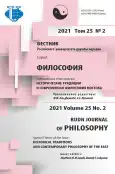Bimal K. Matilal's Philosophy: Language, Realism, Dharma, and Ineffability
- Autores: Bilimoria P.1,2
-
Afiliações:
- University of Melbourne
- RUDN University
- Edição: Volume 25, Nº 2 (2021): HISTORICAL TRADITIONS AND CONTEMPORARY PHILOSOPHY OF THE EAST
- Páginas: 250-259
- Seção: HISTORICAL TRADITIONS AND CONTEMPORARY PHILOSOPHY OF THE EAST
- URL: https://journal-vniispk.ru/2313-2302/article/view/324995
- DOI: https://doi.org/10.22363/2313-2302-2021-25-2-250-259
- ID: 324995
Citar
Texto integral
Resumo
The article considers the theoretical and practical consequences of the so-called "soft" version of epistemological realism in Bimal K. Matilal's philosophical project. The author offers an analytical view on Matilal's philosophy, which helps to understand it in a broader prospective, comparing his arguments on perception and objectivity with contemporary arguments in Western analytical philosophy; in fact, it is possible to view Matilal not only as the proponent of revised Nyāya-Vaiśeṣika approach, but also as the follower of realistic view on language, following L. Wittgenstein, W. Quine, H. Putnam and M. Dummett. Despite the fact that such interpretation may sound diverse or multivocal, it nevertheless helps to better understand both lineages of argumentation: the critical review of the impossibility of private language can be compared in both Western and Indian philosophical discourses, which leads into the domain of social epistemology. The second part of the article discusses the ethical arguments on the vulnerability of moral virtues, and the place of Dharma as a term in moral philosophy. Poetical and metaphorical language appears to be a fruitful strategy to discover the ineffable - and also via negativa and catuṣkoṭi - which is shown by Matilal on the example of the unacceptability of lying. The ethical ineffability and its interconnection with Matilal's commentaries on practical wisdom play the crucial part in the interpretations of Dharmaśāstra texts.
Palavras-chave
Sobre autores
Purushottama Bilimoria
University of Melbourne; RUDN University
Autor responsável pela correspondência
Email: p.bilimoria@unimelb.edu.au
PhD, Principal Research Fellow, School of Historical and Philosophical Studies, University of Melbourne; Нead of Laboratory, Center for the Study of Indian Philosophy and Culture, RUDN University
West Wing, Arts West (Building 148B), Victoria, Australia, 3010; 6, Miklukho-Maklaya St., 117198, Moscow, Russian FederationBibliografia
- Garfield J et al, editors. Special Issue on 25th Anniversary of the Demise of Professor Bimal K. Matilal. Sophia. 2016;55(4):455-576.
- Bilimoria P. Three Dogmas of Matilal Direct Realism, Lingophilia, and Dharma Ethics. In: American Philosophical Association Newsletter. Asian and Asian-American Philosophers and Philosophies. 2017;17(1):11-14. URL: https://cdn.ymaws.com/www.apaonline.org/resource/collection/2EAF6689-4B0D-4CCB-9DC6-FB926D8FF530/AsianV17n1.pdf
- 'Bimal K. Matilal'. In: Brown S, editor. The Dictionary of the Twentieth Century British Philosophers. Vol. II. London/New York: Thoemmes Continuum; 2005. P. 665-667.
- Matilal BK. Moral Dilemmas: Insights from Indian Epics. In: Ganeri J, editor. Philosophy, Culture and Religion Collected Papers of B K Matilal. Vol. I. Ethics and Epics. Delhi: Oxford University Press; 2000.
- Matilal BK. The Logical Illumination of Indian Mysticism. Oxford: Clarendon Press; 1977.
- Matilal BK. Perception: An Essay on Classical Indian Theories of Knowledge. Oxford, UK: Clarendon Press; 1986.
- Matilal BK, Chakrabarti A, editors. Knowing from Words - Western and Indian Philosophical Analysis of Understanding and Testimony. Dordrecht and Boston: Kluwer Academic; 1994.
- Bilimoria P. Śabdapramāṇa: World and Knowledge as Testimony in Indian Philosophy. New Delhi: DK Printworld; 2008. Revised edition from: Śabdapramāṇa: World and Knowledge. Studies of Classical India 10. Dordrecht: Kluwer/Springer; 1998.
- Ganeri J. Introduction. In: Ganeri J, editor. The Collected Essays of Bimal Krishna Matilal: Mind, Language and World. New Delhi: Oxford University Press; 2002. X-XXVI.
- Mohanty JN. Introduction to Relativism, Suffering and Beyond, Essays in Memory of Bimal K Matilal. New Delhi/New York: Oxford University Press. P. 10-11.
- Bilimoria P. Review of Perception by Bimal K Matilal. Australasian Journal of Philosophy. March 1992;70(1):121-123.
- Matilal BK, Shaw JL, editors. Analytical Philosophy in Comparative Perspective: Exploratory Essays. Dordrecht: D. Reidel; 1985.
- Bilimoria P. Postcolonial Critique of Reason: Spivak Between Kant and Matilal. In: Bilimoria P, Al-Kassim D, editors. Postcolonial Reason and Its Critique. New Delhi: Oxford University Press; 2014. P. 1-12.
- Bilimoria P. Bimal Matilal's Navya-Realism, Buddhist 'Lingo-Phobia' and Mental Things. In: Prasad KS, editor. Language and Mind (Volume 2): The Classical Indian Perspective. New Delhi: Decent Books; 2008. P. 17-34.
- Matilal BK. The Problem of Evil. In: Matilal BK. Logical and Ethical Issues of Religious Belief. Calcutta: University of Calcutta; 1982. P. 23-41.
- Matilal BK. Dharma and Rationality. In: Bilimoria P, Prabhu J, Sharma R, editors. Indian Ethics, Volume I: Classical and Contemporary Challenges. Aldershot, UK: Ashgate/Routledge; (2007) 2017; Delhi: Oxford University Press; 2008. P. 79-102.
- Matilal BK. Logical and Ethical Issues of Religious Relief. Calcutta: University of Calcutta; 1978.
- Bilimoria P. Toward an Indian Theodicy. In: McBrayer JP, Howard-Snyder D, editors. The Blackwell Companion to the Problem of Evil. Oxford: Wiley Blackwell; 2013. P. 281-295.
- Sarkar P. The Paradox of Ineffability: Matilal and Early Wittgenstein. Sophia, special issue. 2016;55(4):527-542. https://doi.org/10.1007/s11841-016-0543-z.
- Matilal BK. Philosophy, Culture and Religion: The Collected Essays of Bimal Krishna Matilal, Volume I: Mind, Language and the World. Delhi: Oxford University Press; 2002.
- Phillips S. Counter Matilal’s Bias: The Philosophically Respectable. In: Chakrabarti A, editor. Indian Spiritual Thought. Studies in Humanities and Social Sciences. 1996; III (2):173-183.
Arquivos suplementares









